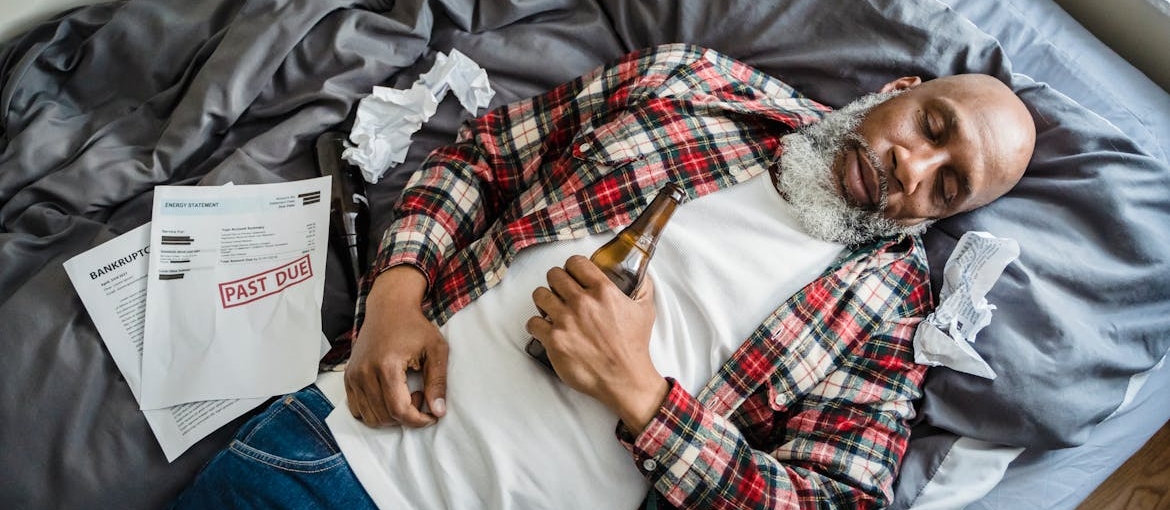Relapse can feel overwhelming, especially after working hard to stay sober for years. Many people face alcoholic relapse after long term sobriety, and while it may seem like a setback, it doesn’t erase the progress you’ve already made. Recovery is not about perfection—it’s about finding the strength to begin again. You may feel guilt, shame, or fear, but these emotions don’t define you. What matters is how you respond and the steps you take now. Reaching out for support is one of the most effective ways to move forward. A West Virginia treatment center can provide the guidance, tools, and care you need to get back on track. You don’t have to face this alone. Help, hope, and healing are always within reach.
Understanding Alcoholic Relapse After Long Term Sobriety
Alcoholic relapse after long term sobriety can be shocking and discouraging, but it doesn’t erase your progress. Many people believe that once they’ve reached years of sobriety, relapse is no longer possible. The reality is recovery is an ongoing process, and relapse can occur at any stage. It doesn’t mean failure—it means more support is needed.

Triggers such as stress, unresolved emotions, or sudden life changes can open the door back to drinking. Instead of focusing on shame, focus on what you can learn from relapse. Identifying the reasons behind it allows you to build stronger strategies for the future. Recovery is not about perfection. It’s about resilience, taking action when setbacks happen, and reminding yourself that sobriety is still possible, no matter how far you’ve come.
The Emotional Impact of Relapse
Relapse is painful not only physically, but emotionally. Many people feel guilt, shame, and fear when it happens. These emotions can make it harder to return to recovery if you isolate yourself. The truth is, relapse is part of many recovery stories. Facing the emotional weight takes support and compassion, not blame.
If you’re struggling, reaching out to an alcohol rehab center Parkersburg WV has can provide the professional care you need. There, trained staff can help you process emotions, develop healthier coping skills, and rebuild your confidence. You don’t have to carry guilt forever. What matters is how you respond now. Recovery after relapse is possible, and your emotions are valid. With help, you can turn this setback into an opportunity to heal and grow stronger in your recovery.
Common Triggers for Relapse
Relapse rarely happens without reason. Most people experience triggers that push them back toward old habits. Knowing these triggers is the first step to preventing them in the future:
- Stressful life events: Job loss, divorce, or financial problems.
- Social situations: Parties or gatherings where alcohol is present.
- Emotional struggles: Anxiety, depression, or loneliness.
- Overconfidence: Believing you no longer need recovery support.
- Old environments: Visiting places linked to drinking.

Healthy Coping Strategies After Relapse
Finding ways to recover after alcoholic relapse after long term sobriety means focusing on practical tools that work every day. You may wonder what happens if you relapse after a long time, but the truth is recovery remains possible. Healthy coping strategies give you real options when old habits return. These approaches include making a clear recovery plan, building stronger routines, and learning stress-relief skills you can actually use.
Creating a Recovery Plan That Addresses Relapse
A relapse can feel discouraging, especially when you thought drinking after long term sobriety was behind you. But making a recovery plan gives you structure and a way forward. Think about what led to relapse and write down what needs to change. Include specific steps for support, therapy, and lifestyle shifts. If you’re older, consider alcohol rehab for seniors, since these programs address the unique needs that come with aging.
They focus on safe detox, health concerns, and group therapy with peers. Having a clear plan in place makes it easier to focus on progress instead of guilt. Relapse doesn’t have to mean starting from zero. You’ve learned what your challenges are, and now you can adjust your path. That’s the true value of a recovery plan—turning setbacks into useful insight.
Building New Daily Routines to Support Sobriety
Daily structure is often the missing piece for those who relapse after years of sobriety. Having a structured daily routine in recovery creates stability, reduces free time, and replaces old patterns with healthier ones. Simple actions matter—waking up at the same time, planning meals, and scheduling time for exercise or hobbies. These steps help reduce triggers and prevent boredom, both of which can lead to relapse.
People who relapse often ask, “why do alcoholics relapse after years of sobriety?” A big reason is falling back into unplanned or stressful lifestyles. Your daily habits are what guide your recovery most. If your days lack structure, triggers sneak in. Building routines that keep you active and connected helps you focus on living instead of craving. Structure isn’t restrictive—it’s freedom from repeating past mistakes.
Using Stress-Relief Techniques Instead of Alcohol
Stress often leads to urges, but healthy outlets can replace the pull of drinking. Here are practical techniques you can use to relieve pressure and protect your recovery:
- Breathing exercises: Calm the mind when stress builds.
- Journaling: Write feelings instead of drinking.
- Exercise: Use movement to release tension.
- Talking with a friend: Share emotions instead of bottling them up.
- Meditation: Refocus thoughts during cravings.
- Music: Distract and comfort yourself without alcohol.

Professional Treatment Options After Relapse
Sometimes alcoholic relapse after long term sobriety requires more than self-guided recovery. Returning to professional treatment may feel like a setback, but it’s often a sign of strength. Treatment options vary and can match your unique needs. You might need inpatient care again, medication support, or therapy that focuses on relapse prevention. Each path provides structure and accountability, helping you rebuild confidence. Exploring these treatment choices can remind you that recovery is always possible.
When to Consider Returning to Rehab
If relapse continues or cravings become overwhelming, it may be time to enter rehab again. Many ask when are recovering alcoholics most likely to relapse, and the answer often lies in times of stress or change. If you feel recovery slipping away, long term drug rehab WV programs provide structure and support that can help.
These programs offer a safe environment where you can focus only on recovery. Extended care allows you to rebuild stability, develop healthier coping skills, and avoid the pressures that exist outside. Going back to rehab is not failure—it is an active choice to protect your health. Relapse doesn’t erase progress; it highlights what needs reinforcement. If you take this step, you’re choosing hope instead of continuing a cycle of drinking.
Medication-Assisted Treatment for Alcohol Relapse
Medication-assisted treatment can be life-changing for someone facing alcoholic relapse after long term sobriety. Cravings and withdrawal symptoms often feel unbearable, but medications can reduce these effects and make recovery more manageable. This doesn’t replace therapy or support, but it strengthens the process. With options like naltrexone or acamprosate, relapse risk can decrease significantly.
If you’re considering treatment, check if you qualify for PEIA insurance rehab coverage, which can reduce financial stress and make care more accessible. Many people avoid treatment due to cost, but insurance can change that. Having both medical and therapeutic support gives you a stronger chance of recovery. Relapse doesn’t have to mean losing control again—it can be the start of a new, supported chapter in your sobriety.
Therapy Approaches That Support Long-Term Recovery
Therapy after relapse isn’t just about stopping drinking—it’s about learning why relapse happened and what to do differently. Options like cognitive behavioral therapy and dialectical behavior therapy for addiction focus on developing new skills to manage triggers, stress, and emotions. Therapy gives you a safe space to discuss guilt, shame, and fears without judgment.
It also helps you strengthen motivation when you feel worn down. Many people who relapse wonder what happens if you relapse after a long time. Therapy answers this with guidance—it shows relapse is a signal for adjustment, not failure. Long-term success in sobriety is about resilience, not perfection. Professional therapy is one of the best ways to regain balance, restore hope, and keep recovery sustainable after relapse.

Preventing Future Relapses
Relapse is part of many recovery stories, but it doesn’t have to repeat forever. Preventing alcoholic relapse after long term sobriety means staying aware of triggers and building stronger coping strategies. This includes knowing early warning signs, improving your response to risky situations, and strengthening your commitment to long-term recovery. Each step makes relapse less likely. With the right tools and support, you can protect your progress and keep moving forward.
Identifying Early Warning Signs of Relapse
One of the biggest risks after alcoholic relapse after long term sobriety is ignoring warning signs. Triggers often show up first in small ways—mood changes, skipping support meetings, or feeling restless. When these go unaddressed, relapse becomes more likely. That’s why paying attention early is critical.
Attending therapy, checking in with support groups, and being honest about feelings can help. If alcohol cravings increase, seeking stimulants rehab options may also be useful if multiple substance issues are involved. Awareness is power. When you recognize the first signs of relapse, you gain the chance to act before drinking begins again. Early action saves recovery.
Developing Coping Skills for High-Risk Situations
High-risk situations can make recovery feel harder, but planning ahead gives you control. These simple strategies can help you handle cravings before they lead to relapse:
- Identify triggers: Know what environments or people cause cravings.
- Plan responses: Practice saying no to alcohol before you’re offered.
- Stay connected: Keep in touch with sponsors or support groups.
- Replace habits: Do something positive when cravings start.
- Use grounding: Focus on sights, sounds, or touch to calm urges.

Staying Committed to Long-Term Recovery Strategies
Commitment after relapse often feels harder than starting recovery the first time. You may feel discouraged but staying consistent matters most. Recovery isn’t about never slipping—it’s about continuing forward. Relapse shows what areas need more support. Adjusting your routines, seeking therapy, and rebuilding connections are part of commitment.
Ask yourself daily why you want sobriety and remind yourself of the progress you’ve already made. Even after relapse, your effort is not wasted. Every sober day counts, and every small choice builds strength. When setbacks happen, reach out to support immediately instead of isolating. Long-term sobriety is built through persistence. You’ve proven before that you can recover, and you can do it again. Staying committed is how you keep moving toward the life you want.
Support Systems in Recovery After Relapse
Recovery becomes much stronger when you have people by your side. After relapse, it can feel tempting to hide, but isolation makes recovery harder. Support systems give you accountability, encouragement, and guidance to keep moving forward. These networks remind you that you don’t have to fight relapse alone. Having people who understand your struggle can make all the difference. Here are some support systems that can help you after relapse:
- Family: Loved ones who encourage and support recovery.
- Peer groups: 12-step programs or local recovery meetings.
- Sponsors: A mentor who offers accountability and advice.
- Professional therapists: Guidance for both emotional and behavioral needs.
- Friends in recovery: People who understand the challenges.
- Online groups: Virtual support when in-person isn’t possible.
- Faith-based communities: Spiritual guidance and encouragement.

Moving Forward With Hope and Strength
Relapse can feel like losing everything you’ve worked for, but that isn’t the truth. Alcoholic relapse after long term sobriety does not erase your progress or mean you have failed. It simply shows that recovery is an ongoing process, one that sometimes requires new tools and support. You don’t have to face this moment alone. Reaching out to professionals, leaning on loved ones, and reconnecting with treatment can help you get back on track. Every step you take now matters, no matter how small it feels. What’s important is choosing not to give up on yourself. Recovery is still possible, and your future can look different from your past. You have another chance to rebuild your strength and move forward with hope.



